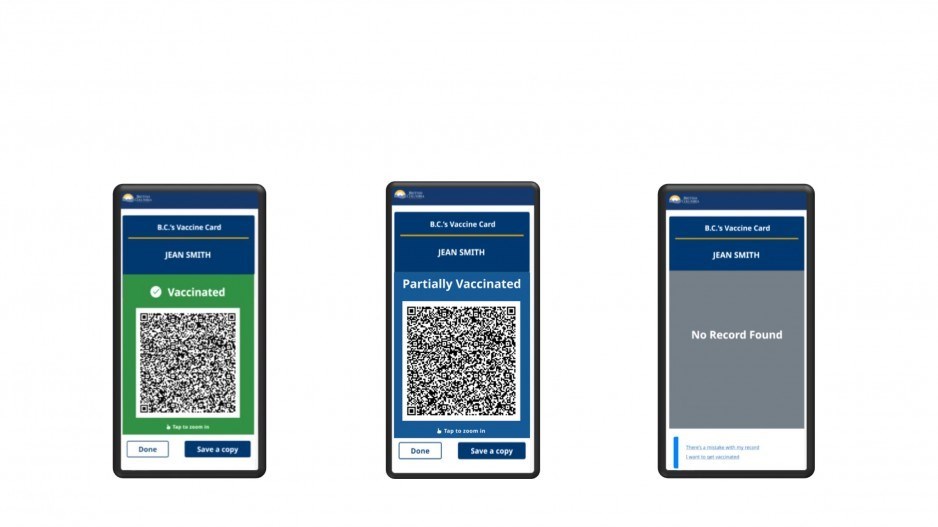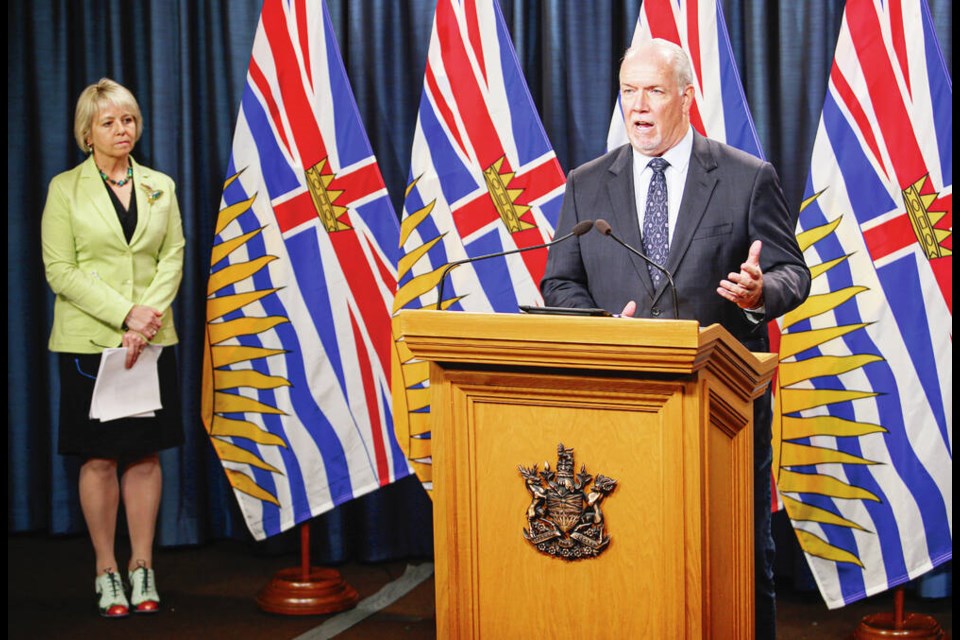The province introduced the B.C. Vaccine Card on Tuesday, a code that can be downloaded on a mobile device or printed to show proof of COVID-19 vaccination required for entry to some non-essential businesses, venues and services starting this month.
Premier John Horgan, who was joined by Health Minister Adrian Dix and provincial health officer Dr. Bonnie Henry, said there has been a 200 per cent increase in people being immunized since the card was announced last month. Getting vaccinated and using the B.C. Vaccine Card means we can bring people back together again safely and get our economy running on all cylinders, he said.
Horgan said he’s unapologetic for encouraging vaccination. “It’s abundantly clear that the COVID fourth wave is confined largely to those who have not been vaccinated, so we are anxious to get more people vaccinated.”
About 60,000 cards have already been issued since the registration website launched Tuesday morning.
The vaccine card — required as of Sept. 13 — is being introduced to limit COVID-19 transmission and to support capacity limits and a mask mandate for indoor public areas.
On Tuesday, 78 per cent of people age 12 years and older in B.C. are fully vaccinate and tens of thousands more have had a first dose since the card was announced last month.
Recent modelling from B.C. Centre for Disease Control shows unvaccinated people are at greater risk of getting infected, being hospitalized and dying of COVID-19.
With a current surge in cases — primarily in groups of unvaccinated people — “we're doing exactly what's required to save lives,” Dix said.
A grace transition period will allow people to use their paper record, received at vaccination clinics, until Sept. 26. After that, a B.C. Vaccine Card — digital or printed — will be the only accepted form of proof. By Oct. 24 an individual must be able to show they have received two doses of a vaccine.
The B.C. Vaccine Card will be needed to access businesses such as bars, restaurants and movie theatres. It will not be required for essential services, including health-care centres, pharmacies, grocery stores, fast-food restaurants/courts and cafeterias, or municipal or provincial services.
Proof of vaccination will also not be needed to vote in-person in the Sept. 20 federal election or in-person at advance polling places.
The card will be in place until Jan. 31, 2022, when the need will be reassessed.
To get the card, go to healthgateway.gov.bc.ca/vaccinecard. You will be prompted to enter your personal health number, date of birth and date of vaccination. The website will generate a QR code that can be downloaded or saved onto a mobile device. Be sure to save or screen shot the card and code before clicking the "Done" button. The code can also be saved and printed out.
Those without a mobile device, computer or printer can call the provincial vaccine hotline at 1-833-838-2323 to have a printed vaccine card mailed to them. People can also visit one of the province’s 64 Service B.C. Centres to have their card printed.
That digital or printed code — essentially your B.C. Vaccine Card — will include your name and vaccination status and a B.C. logo. You will be required to show that code along with a piece of valid government photo ID — for people 19 years of age and older only — to enter many non-essential businesses, services and venues.
Families and caregivers can carry a copy of their family member’s or dependent’s B.C. Vaccine Card with them or save multiple vaccine cards to their mobile device, the province said.

Businesses will be able to scan the B.C. Vaccine Card code via the BC Vaccine Card Verifier app, which will be released by Sept. 13.
They will be required to scan a customer or client’s paper or digital vaccine card to check for proof of vaccination.
The app can read only COVID-19 vaccination information and no additional health information will be stored on the app or smartphone, according to the province. The card does not hold other health information.
Information for businesses, including step-by-step instructions can be found at: gov.bc.ca/VaccineCard-Businesses. An information call line for businesses will be available as of Sept. 13, according to the province.
The B.C. Vaccine Card was designed using the global SMART Health Card framework. This is the same technology being used in other provinces with the aim of creating a consistent approach, according to the province. It may also be used for international travel.
“These measures that we’re putting in place will be mirrored in other jurisdictions across Canada,” said Horgan. Quebec, Ontario and Manitoba have similar card requirements underway.
The province reminded users Tuesday not to post their personal QR code on social media.
Those who find mistakes in their vaccination records pertaining to either their first or second dose are asked to submit updates through immunizationrecord.gov.bc.ca or call 1-833-838-2323.
Students who were vaccinated outside of B.C. will need to submit their records online to obtain a B.C. Vaccine Card.
The province is hopeful the turnaround for this will be four to seven days.
How to get your B.C. Vaccine Card
Step 1 — Go to gov.bc.ca/vaccinecard. Enter your Personal Health Number, date of birth and date of vaccination. This will
Step 2 — Save the card to your mobile device or print it.
About the B.C. Vaccine Card
The vaccine card for those born in 2009 or earlier will be required for:
- Indoor ticketed concerts, theatre, dance, symphony and sporting events
- Indoor and outdoor dining at restaurants, pubs and bars
- Nightclubs and casinos
- Movie theatres
- Gyms, pools and recreation facilities (does not include youth recreational sport)
- Indoor high intensity group exercise
- Indoor organized gatherings like weddings, parties, conferences, meetings and workshops
- Indoor organized group recreational classes and activities like pottery and art (does not include K to 12 school and before and after school programs)
- Post-secondary on-campus student housing (partial vaccination required by Sept. 7)
ceharnett@timescolonist.com



